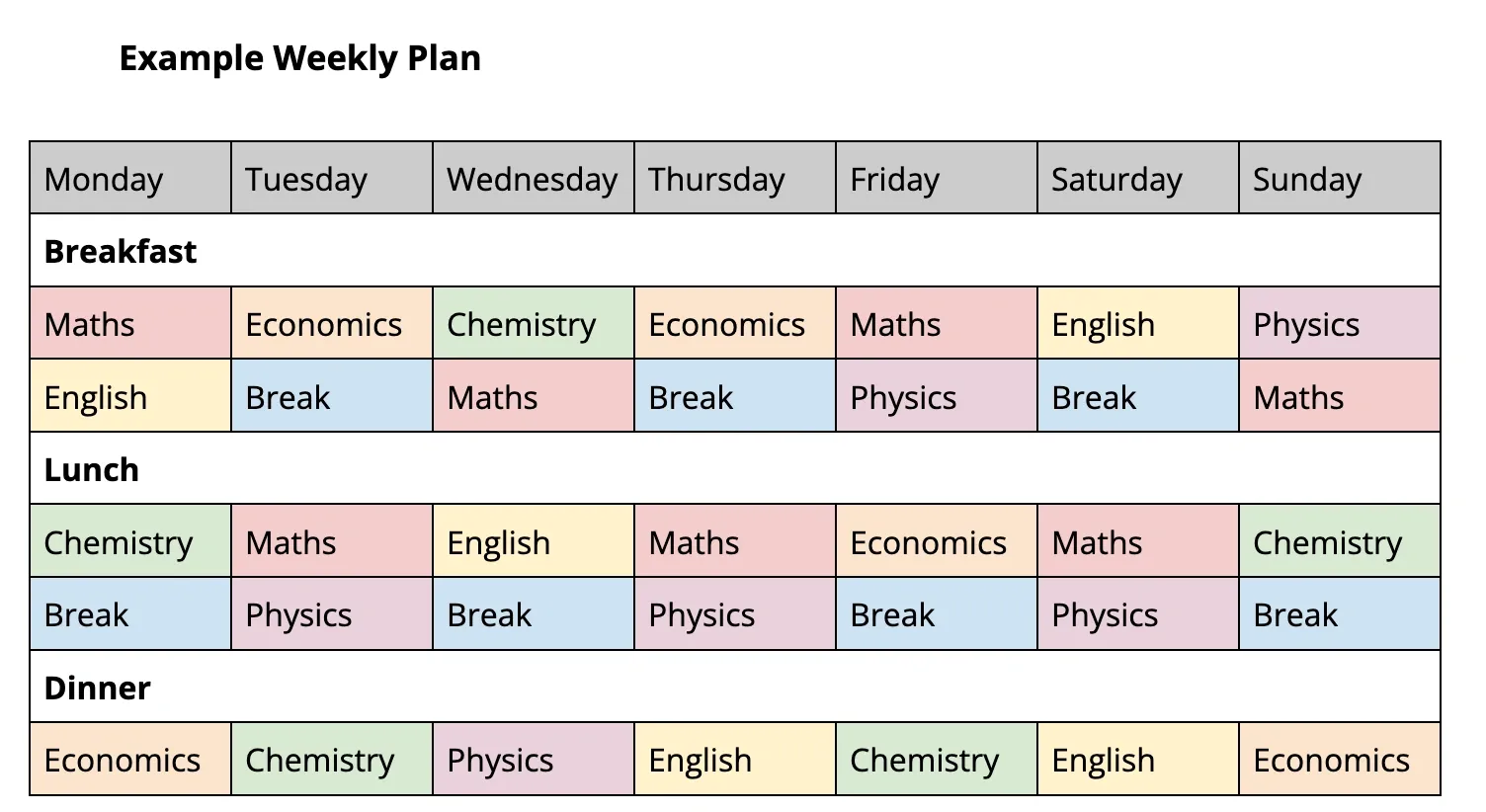“Wait… the HSC trials are here already?”
If you’re feeling like this, I totally get you - but putting that temporal dread and gut-sinking regret aside, what exactly are you heading into? What are the trials, and are they as big and scary as they seem?
What are your HSC trials?
The trial HSC Examinations are the final set of assessments your school gives you, and contribute significantly to your “internal mark” (typically weighted around 30-40%). Just like the name suggests, they are essentially a ‘test run’ to give students a taste of the HSC experience. Taking the learnings from your trial exam block, you’ll be able to adapt your habits when preparing for your final HSC exams, which contributes to your “external mark”.
Now for these reasons, the trials can be daunting, and that’s perfectly normal! But with the right mindset and a proactive attitude, you’ll come to realise that trials aren’t that bad after all.
Without further ado, here are my top studying hints and hacks to teach you how to study for HSC trials!
Balance revising theory and practical application
It’s all well and good to know that we need to study to do well in trials, but what does that actually look like? Naturally, the ideal quality study session is different for every person, but here are some suggestions to study effectively:
Create your own set of study notes (the theory aspect).
Writing stuff down in your own words, structured in a way makes sense to you, is probably one of the best ways to revise. If you want crazy cheat codes into how to write the most detailed and effective notes, you can explore the article “How to Write the Most Effective Set of HSC Study Notes | Project Academy”.
Ideally, you make a set of study notes in the weeks leading up to your trials, but remember it’s never too late to start. Plus, you can use these notes to prepare for your external HSC exams as well!
Doing lots of practice exams (the practical aspect).
I’m sure you’ve heard this a thousand times, but the best way to learn is to make mistakes and improve upon them. One way to do this, is to do past papers under timed conditions, marking it, and then correcting your mistakes. It’s an unbeatable method to figure out which topics you’re great at, and which ones need tidying up.
If you aren’t sure where to look for practice exams, here are some recommendations:
-
THSC Online is also a fantastic website with a variety of Trial papers and HSC papers with worked solutions! (Note: Only attempt papers from 2017-now, as the syllabus was different prior to this).
-
Your school will likely have a compilation of previous trial exams that you can use - remember to ask your teacher.
-
Project Academy provides you with a huge range of practical materials. They also offer a 12-week LEAP Program with weekly mock exams, in-depth and personalised feedback, and in-person exam reviews.
Find a good study space that helps you concentrate
Where you choose to study can also affect the quality of your studying. The better the study space, the more likely you can enter a “flow state”, and knock out all your tasks for the day. Now, the “ideal” study spot looks different for everyone - it can be your room, a public place like the local library, or the living room floor (my personal favourite).
Some basic requirements for an ideal study spot include:
-
Peace and quiet - the less distractions, the better.
-
Powerpoint outlets - to charge your devices.
-
High speed Wi-Fi - to access resources online, Google Classroom etc.
If you don’t want to study at home, some other recommendations include:
-
Your local library - a nice and accessible public space, often complete with Wi-Fi.
-
Your local cafe - this one can be a bit tricky, you often need to purchase a drink to stay on premises, but if you’re down for a coffee while studying then this is great.
“Grasslands” and “Firelands” at Project Academy - a perk exclusive to Project students, these study spaces are equipped with all the requirements mentioned above, and has the perfect vibe to trigger your productive flow.



Grasslands at Project Academy
For more detailed information on staying focused, I would highly recommend taking a look at the following article “Getting into the Zone: Flow State & Pomodoro Technique | Project Academy”, which elaborates on the Pomodoro technique and staying motivated.
Try thinking about your previous experiences studying in earlier years to gauge what works best for you.
Never underestimate the power of a study buddy
While studying for the Trials, I found having a small group of my friends as ‘study buddies’ really helped me to keep on task and stay motivated. Anecdotally, here were some of the benefits:
-
Accountability - having other people around me who were working on the same thing was really motivating and stopped me slacking off.
-
Peer marking - we studied by doing timed practice exams together, marked each others’ answers (which is more objective than marking our own work), and worked through the solutions as a group to ensure everyone understood every answer.
-
Teaching each other - explaining something to someone else is a highly effective way of studying. It forces you to truly understand the content, and be able to verbalise it succinctly, which is pretty much what you do in an exam anyway.



Having study buddies definitely made the whole studying routine a lot more enjoyable for me. However, if you prefer to study alone, that’s perfectly okay too!
Nail the art of planning
Using your time effectively each day is the key to unlocking your full potential for your trial HSC exams, so delaying all of your studying until 11pm on the night before an exam is absolutely out of the question. This is where the art of planning comes into play.
(Also, it’s an epic soft skill to have as you venture into the adult world, where there’s a million things to do and not enough time in the day.)
How to time-block and make good study plans
A tried-and-true method for effective planning, is to “time-block” at the beginning of every day or week. This helps you milk every minute of every day. Simply:
-
Split the day into 5 equally sized blocks (roughly 1.5-2 hours each)
-
Allocate a subject into each block - it might help to not do the same subject twice in a row
-
Allocate more blocks to a subject you’re weak in
-
Make sure to allocate time for meal breaks - this helps you create realistic study timetable
As an example, here is a weekly plan using the above method:



For more advice on creating a good study plan, I recommend this article: How To Study For HSC: Constructing Study Habits.
Avoid academic burnout
Preparing for your HSC trials is like driving a car: flooring the accelerator too hard will completely deplete your petrol (not to mention damaging your engine)! We want to avoid this at all costs - running out of steam is a very common problem, so maintaining a good BALANCE is super important.
Here are some tips to avoid burnout:
- Have a break
(And no, this isn’t a segue into a Kit Kat ad.)
The more tired you are, the less productive you will be. To make sure you’re sufficiently energised throughout the day, you need to take regular breaks. I like to make my breaks about 5-20 minutes long, long enough to feel reenergised, but short enough that I can re-enter flowstate quickly.
- Reward yourself
If you have been working hard, you absolutely deserve to treat yourself a bit! It doesn’t need to be anything extravagant, it could be as small as allowing yourself a handful of gummy bears from the kitchen after finishing your essay!
- Prioritise your mental and physical health
Being well-prepared for your HSC trials and final exams involves balancing studying with mental health loads and other aspects of life.
For mental health:
-
Journalling - a great way to release pent up emotion (which you likely have truckloads of, given you’re in Year 12)
-
Taking walks in the sun - fresh air is always good, and vitamin D does wonders for your health
-
Maintaining your social life - make the effort to hang out with friends, see a movie, go to karaoke etc.
For physical health:
-
Keep moving - whether it’s kicking a ball around aimlessly with your siblings, joining a club, taking a dance class, going to the gym etc.
-
Staying hydrated - aim for 2L of water a day
-
Eating nutritious food - it can be tempting to eat junk food when you’re stressed, but prioritise nutritious meals that will actually fuel your body (including your poor brain that’s working overtime).
-
Getting a good amount of sleep every night
PS: If you struggle with your sleep schedule, you may want to check out this article: “How to Fix Your Sleep Schedule During the HSC Year”.
Conclusion
So now you’re all ready to take on the HSC Trial Exams! Make sure you keep a positive attitude throughout the lead-up to the exams, and I hope you found these pointers helpful to you!
Final little note: you’ll also come to realise that your performance in your HSC trial exams can give you an indication of your final mark, but will not determine how you do overall. That all comes down to how you handle yourself in the leadup to your final exams. If you’re curious about this, check out “How To STUVAC: Using Study Breaks and Holidays to Your Advantage”.
And that’s it, best of luck to all Year 12 students!









